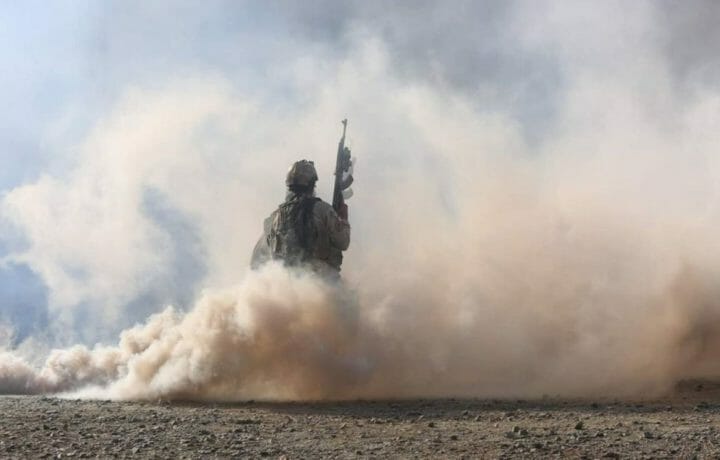Peace is dead, long live peace.
This week, for the hundredth time, the Taliban militia has broken its agreement with the United States. This time, most brutally, by attacking major cities and conducting cruel war crimes against Afghan citizens. The United States envoy for Afghan peace has been especially silent on the issue, earning the contempt of many Afghans who are asking, “Where is Zal?”
The Taliban and their Pakistani backers seem to be completely disinterested in peace as they burn, rape, and murder their way into various population centers to slaughter Afghan women, children, and elderly men. These militia forces are mostly avoiding encounters with the ANDSF.
The ANDSF is busy trying to carefully clear the terrorists from urban areas to avoid civilian casualties. In locations they can engage with the fleeting Taliban the ANDSF is inflicting heavy casualties through the use of Afghan and US airpower.
The Afghan government is in the same position on peace as it has been since September 2020. They stand ready to make peace, but in the absence of a reliable party to negotiate with, are having little success. The Afghan people are voicing their frustration with the slow pace, and their horror at what the Taliban is doing instead of waging peace.
The international community has really been exposed for its inability to put pressure on the Taliban this month. While embassies and envoys tweet or speak about the desire for a Taliban ceasefire, they have taken little action to make it so. Diplomats currently working on the process have failed at every turn to condemn Pakistan for its continuing support to the Taliban and its hosting of the Taliban leadership in various locations in Pakistan. This lack of action has not gone unnoticed by Afghans who are turning to other Afghan allies outside of government to sound the alarm of continuing Pakistan support for terrorism that is killing hundreds of Afghans daily.
A quick review and assessment of the Doha Process
The U.S.-Afghan agreement signed on the morning of February 29, 2020 stated unequivocally that the United States was an enduring security partner of the Islamic Republic of Afghanistan. It was also clear that the U.S. only recognized IRoA as the legitimate government of the Afghan people.
The U.S.-Taliban agreement signed later in Doha Qatar stated unequivocally that the United States did not recognize the Taliban as any type of Afghan government in exile, but only as an organized militia force that should seek peace with the Afghan people they have been fighting.
The U.S.-TB agreement had one major aim, to get the Taliban militia to sit in a room with the Afghan government and start to make a serious effort at peace building. That meeting, where the Taliban finally had to recognize the existence of the Islamic Republic of Afghanistan, took place in September 2020.
Since the direct IRoA-TB talks began, the Taliban have failed to meet the remainder of the promises of the U.S.-TB Doha agreement. Taliban have not renounced violence by groups attacking the US or their allies, like the Afghan people. Nor severed ties with and prevented terrorists from entering Afghanistan. Taliban have not met the requirements that require a full withdrawal of international military forces. Taliban have not made measurable progress towards peace in the Intra-Afghan talks, nor built any trust through prisoner exchanges. The Taliban prisoners quickly returned to terrorism and violence against Afghans further decreasing trust between IRoA and the Taliban. Finally, the Taliban have not entered into a permanent and comprehensive ceasefire.
By this measure the Taliban have completely failed the U.S.-TB agreement. They have also completely failed to make good on their promises to attempt to make peace with the Islamic Republic of Afghanistan and the Afghan people. This is all the proof that the international community should need to start a new round of punishment on the Taliban, and any nation or person that supports their terrorism, human rights violations, or war crimes.
What the International community can do
Here are just a few of the things that the envoys and national leaders can do if they want peace to begin in Afghanistan and want to end the indiscriminate Taliban/AQ violence occurring across the nation. Most of these ideas are being discussed openly by Afghans every day, they are not hard to figure out.
- Demand that Qatar close the Taliban Doha outpost.
- Move the Afghan peace talks to Kabul or any city of the Taliban’s choosing in Afghanistan.
- Demand that Pakistan immediately eject all Taliban leaders into the custody of the Afghan Foreign Ministry or a 3rd party mediator in Kabul.
- Empower a non-U.S. mediator to move the peace talks forward. Many Afghans, and others, are loudly demanding the removal of Ambassador Khalilzad right now.
- Designate more Taliban members as international terrorists; if not the entire organization.
- Expose the Pakistani support for terrorists like the Taliban from both inside and outside their government. Then sanction them individually as supporters of terrorism.
- Send a carefully selected peacekeeping force from Muslim nations, excluding Pakistan, to secure the people and infrastructure in various locations in Afghanistan.
- Send special operations forces from across the NATO coalition back into Afghanistan under the command of the ANDSF.
- Send more air support and aviation maintenance support into Afghanistan.
- Close and secure the most popular border crossings to allow the ANDSF to eliminate the terrorists currently inside the country and stop the flow of foreign fighters from around the region.
Hold a special meeting at the UN Security Council to identify individuals and nations that need to be referred for terrorism sanctions or possible indictment in the International Criminal Court.




